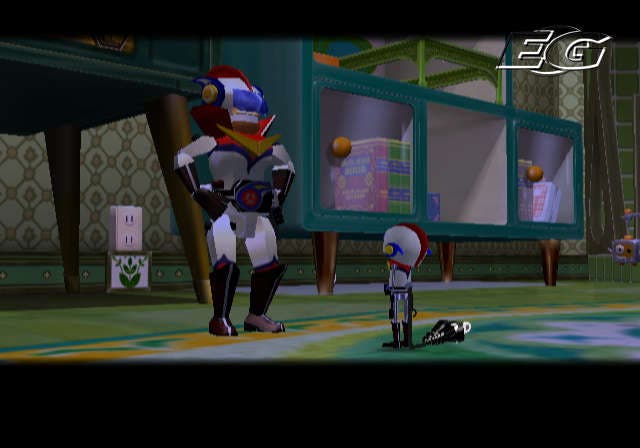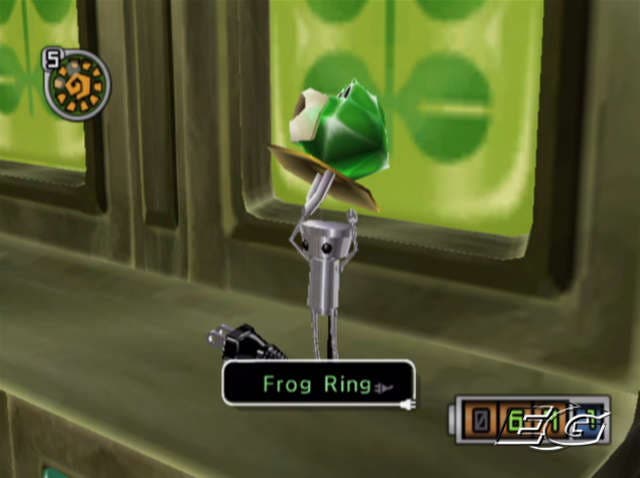Chibi-Robo!
He cleans up real good.
The Nintendo GameCube has to be one of the poorest wee souls of gaming. Despite hosting some of the best games seen on any system, I imagine that by now anyone with a GameCube has relegated it to doorstop status, with only the mildest of worries about an unstopped door swinging in the wind when The Legend of Zelda: Twilight Princess is released. With even the Dreamcast somehow scraping a steady stream of high quality, largely exclusive shoot-'em-up titles in Japan over four years since the end of it's production, it's depressing to see nothing but a dribble of off cuts from multi-platform franchises lining the release schedule for the GameCube.
This makes something like Chibi-Robo an almost astonishing surprise. The kind of title that not only makes it imperative that you plug your GameCube back in months before you'd planned to, and well before you'd bought that replacement doorstop (insert defunct platform of choice here), it's a title that engrosses you to the point where you have an almost gleeful disregard for your now dangerously ajar door. Because you have a new home in which to worry about things like that. The home of the Sandersons.

The Sandersons are your typical all-American family; typical, that is, from the viewpoint of a Japanese design team (reference points: Katamari Damacy, Mr. Moskeeto). The father, known only as Mr. Sanderson, is unemployed and sleeping on the couch due to an argument with Mrs. Sanderson, his put-upon housewife, over the gift he bought their disturbed, frog-obsessed daughter Jenny for her birthday. You.
As hotly debated birthday gift Chibi-Robo, it's your task to heal these rifts within the family through a life of servitude to your new human masters. With the tight leash of your continually decreasing battery power, recharged from helpfully placed power outlets, you explore the huge Sanderson homestead (well, huge from the viewpoint of a four-inch-tall robot) cleaning their surfaces and disposing of their rubbish to 'spread the happiness', as your slightly irritating companion and manager Telly Vision tells you.
Telly Vision acts as the player's occasional tutorial and voice, with Chibi-Robo remaining steadfastly quiet, but thankfully he very rarely interrupts gameplay with nuggets of wisdom, though he does repeat himself extensively. He is most useful at the end of each day/night cycle when he recharges Chibi-Robo and re-evaluates his 'Chibi Ranking'. A ranking system that allows Chibi-Robo to increase his battery life, coming first in the rankings would bestow the title of 'Super Chibi-Robo'. Starting at the lowly ranking of one millionth, with the difficulty of improving in rank near-exponential, it takes a while to get there, as does seeing all of the Sanderson household, with Chibi-Robo needing to gain helpful items and create 'Utilitibots' to help him explore.

The closest comparison to Chibi-Robo is the Harvest Moon series, and it's likely that the description of domestic toil is as much a turn-off to the average gamer as the frantic farm work found in the Harvest Moon titles is. But much like the way the Harvest Moon titles turn something that sounds boring into something truly unmissable with bags of charm, Chibi-Robo transcends even that with a world that is truly unforgettable.
At night, or when the humans aren't looking, the toys in the Sanderson household have their own active lives that Chibi-Robo can help in his adventures, getting involved in events that pan out like miniature plays, with love triangles (nay, love dodecahedrons) between toys, and some scenes with a real pathos behind them. It's honestly one of the most touching games I've played in ages, and it's these scenes, with Chibi-Robo as a quiet, passive observer, that make it so heartbreaking when your time in his world comes to an end.
Not that this happens too quickly. It's entirely up to the player how much of the home to explore and how much to do as each day passes, and, indeed, the player can choose to lengthen the days and nights from five minutes to ten or fifteen should they wish a more leisurely pace, and you could choose to spend days simply cleaning the house, entirely unconcerned with the main plot or the many sub-quests on offer. And while these cleaning tasks may seem menial and dull, they and the entire game are infused with a beautiful sort of musicality - scrubbing the floor with a toothbrush plays an acoustic guitar part that matches perfectly in tempo, and the sound of Chibi-Robo running across the varied surfaces is a cornucopia of different tones and sounds. It feels like the seed of a new way of using music in games.

Not to say that Chibi-Robo is without problems. Much like another groundbreaking title, Ico, it's marred with a camera that can often be unhelpful (though with some C-stick usage can be reined in), and combat that feels entirely unnecessary. A subplot featuring the evil 'Cybogz' is a nice riff on ridiculous 'extreme' children's toys, but much like Ico's shadows, the combat is messy and uninteresting. Neither is Chibi-Robo particularly difficult; much more an 'experience' than a gaming challenge.
Chibi-Robo is, quite possibly, the best game I've played this year. While it's not for everyone, those who are willing to look past what they could consider childish graphics, and an obsession with housework that's nearly as strong as your mum's, will find a title with as much heart as there is fun wrapped up into a four-inch-tall bundle. Chibi-Robo doesn't deserve to be relegated to being a mere cult hit. Buy a new doorstop.

